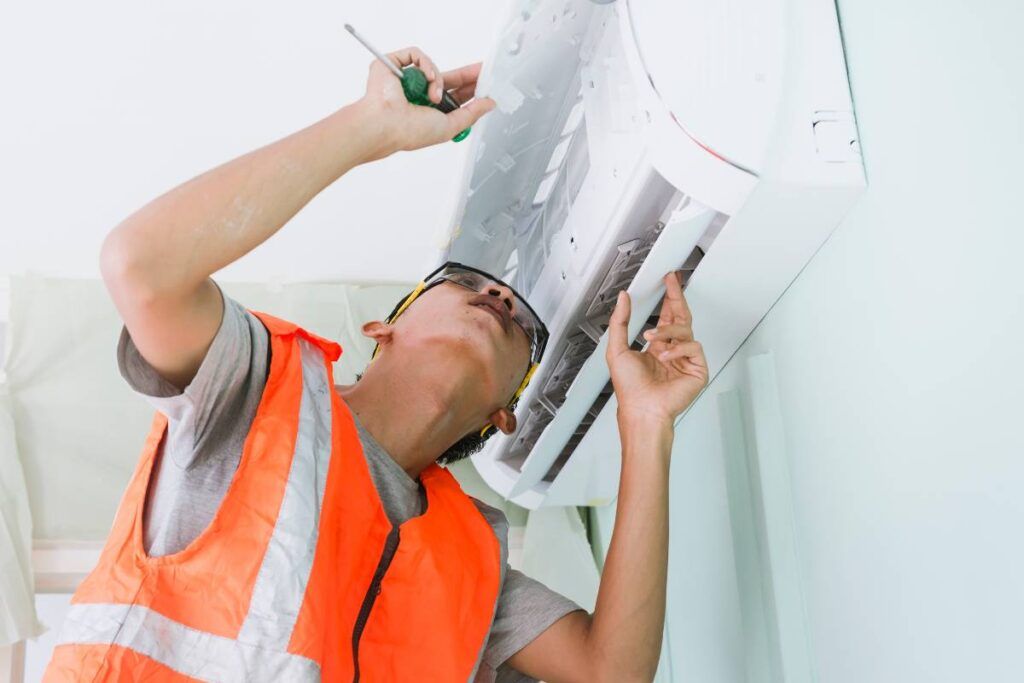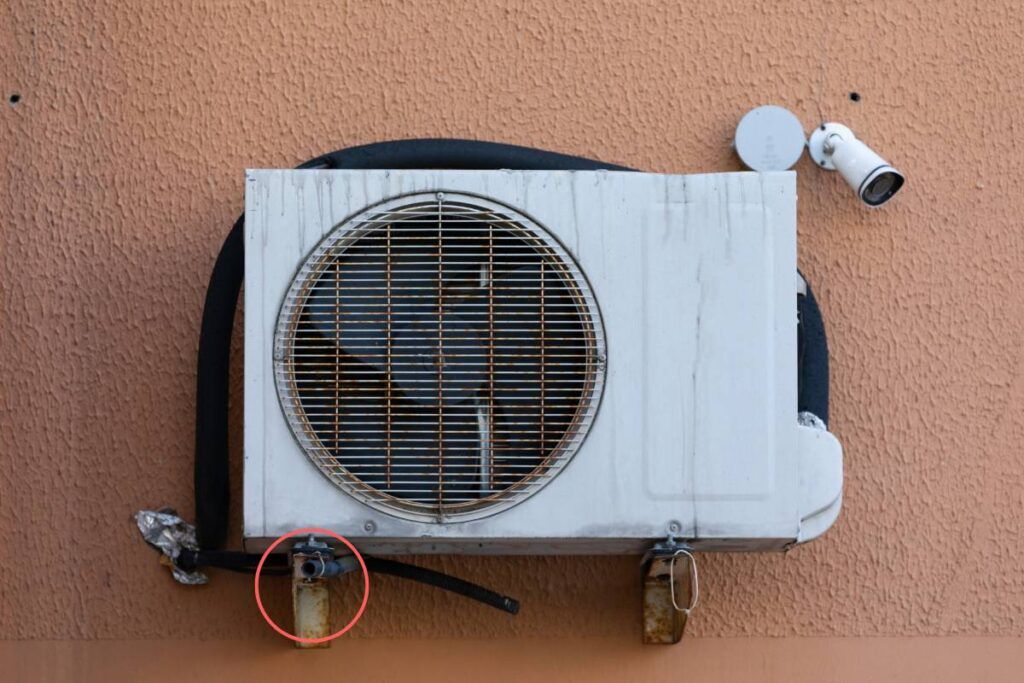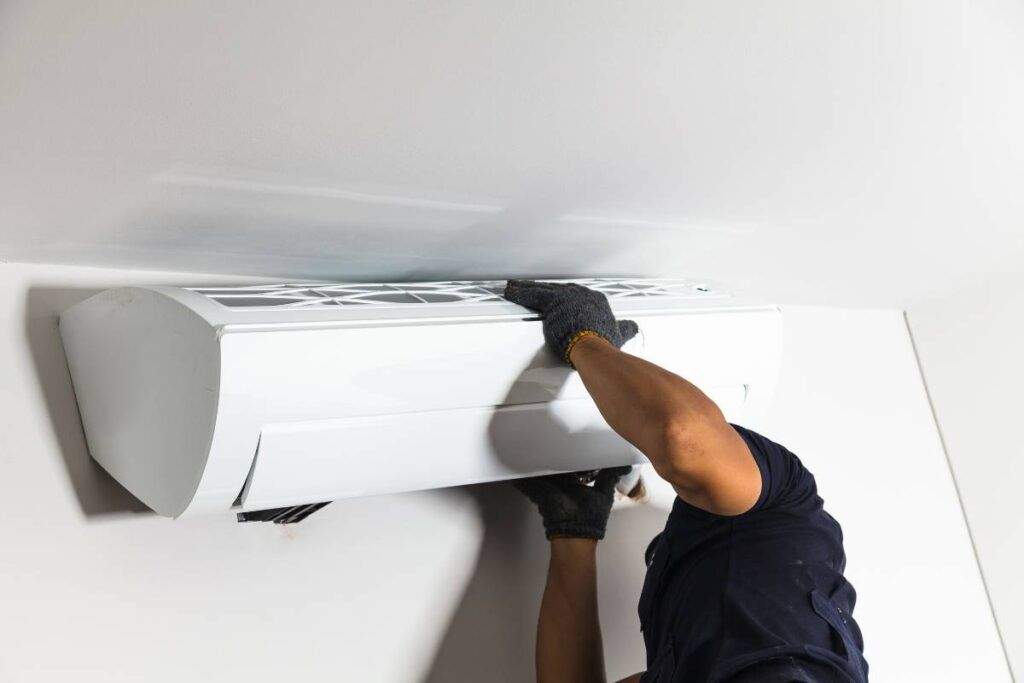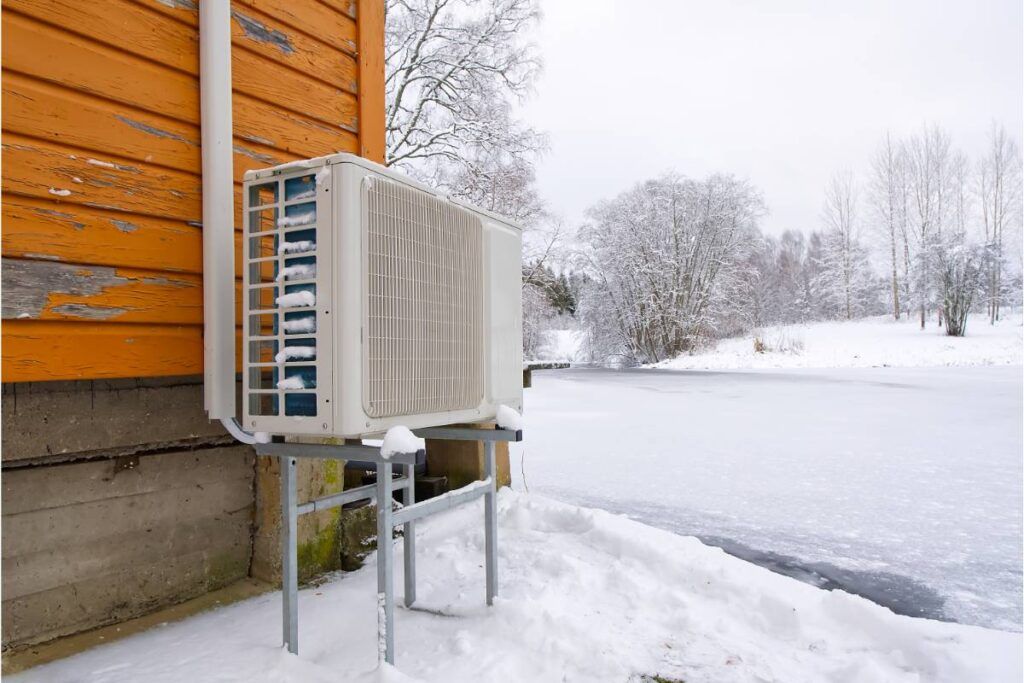Everyone wants their air conditioning unit to run efficiently, especially during summer. In some areas, it is impossible to live without an AC. But a leaky unit is frustrating and a serious problem.
An air conditioner leaks water due to leaky refrigerant, dirty filters, broken fans, clogged or cracked drain pans, broken condensate pump, frozen coils, and poor insulation. To fix it, check for ice, change filters, and fix the drain lines, condensate pump, and refrigerant.
There are more reasons. This guide will explore the reasons behind a leaking AC, the dangers, and the solutions. Hire a professional HVAC team if you can’t fix the problem yourself.

Check out our list of top-handpicked products for all your electrical, appliance, and HVAC system needs to keep your home running smoothly.
This post includes some affiliate links.How and why does water accumulate inside the air conditioner?
The air conditioner maintains the temperature of the house.
The indoor AC has an evaporator coil that condenses the warm air and makes it less humid.
As a result, the moisture drips into the drain pan and enters the drain line.
The drain line goes out of your house to drain the water outside.
Water forms in the system when the unit accumulates too much moisture and has trouble getting it out if the drain line is clogged.
The air conditioner must drain the maximum water it produces through the drain line.
If the line is clogged, the water won’t drain and stay inside the unit.
As a result, it will cause the unit to leak water.
Another reason is ice collection.
The internal AC fans will blow the air into the unit’s cold coils when the water is too much.
These coils will ice over the water and affect your unit’s efficiency.
Whenever you turn off the AC, the air inside the unit will heat and melt the ice, resulting in water leakage.
So, that is how the water develops inside the unit.
How much water should the air conditioner drain?
An AC must drain at least 5-20 gallons of water daily.
It must drain 5 gallons of water daily during arid weather and 20 gallons per day during high humidity.
It is normal for the AC to drain 5-20 gallons of water outside your house.
The unit will drain this water naturally, which is the humidity of your house.
If the unit doesn’t drain, water will accumulate and drip inside your house.
Additionally, the thermostat setting also plays a role in determining the drained-out water quantity.
But that depends on the circuitry work with other ACs.
Why does an air conditioner leak water?

Leaky air conditioners are annoying and dangerous.
Accidents and electrical hazards could occur if the leakage is too much.
So, it is important to know the root cause and prevent it.
Reasons include:
- Leaky or low refrigerant
- Dirty air filters
- Broken blower fans
- Drain clogging
- Cracked or rusted drain pans
- Frozen AC coils
- Poor insulation
- Improper installation
- Drain line disconnect
- Broken condensate pump or float switch
- Cold weather
We will discuss all the potential reasons and their solutions.
1. Leaky or low refrigerant
The refrigerant helps to cool down the air.
Without this, the air conditioner will not work.
Over time, old age and constant wear and tear will cause leakage in the refrigerant tank, causing a fluid leak.
Sometimes the low refrigerant charge does not match the manufacturer’s features.
So, the unit won’t perform well.
The house owners will mistake this fluid to be water as it is clear as water.
To differentiate between the fluid and water, see if it has puddled for a long time.
The refrigerant fluid turns into a gas quickly, which can be more dangerous.
You must fix the leak as soon as possible to prevent health hazards.

How to fix it?
The refrigerant liquid of the air conditioner is acidic.
It causes the metal to erode and leak over time.
You need to replace the refrigerant tank with a new one.
So, if there is any refrigerant leak, consider the following steps for replacement:
- Turn off the unit’s main power at the breaker box to avoid electrocution.
- Drain the refrigerant by siphoning it out with a plastic hose.
- Find the leak. It could be a small crack, erosion, or a rusted area.
- Remove the leaked refrigerant tank.
- Contact your air conditioner’s manufacturer to fix it. Or, you can find the guide to get the right refrigerant pan for your model.
- Screw the new tank inside the unit, and refill it with the fluid suggested by the manufacturer.
- Turn the unit on and see if there are any further leaks. Make sure the air coming out is cold enough.
- If you still can’t fix it, call the professional team.
Also, check the refrigerant charging’s performance during installation.
The condition will worsen if the charge is low or the refrigerant is added to the full system.
You cannot correct this yourself.
So, professional guidance is compulsory.
2. Dirty or broken air filters
Dirty or broken air filters can leak water out of the AC.
When the filter gets clogged by dirt, debris, and other particles from the air, it causes a condensation buildup inside the unit.
As a result, the water will gather inside the unit and drip.
You can put your hands inside the unit before the vents to confirm the problem.
If the air pressure is lower than normal, check the filter and try seeing through it.
If there is dirt or any broken area, you need to fix it.

How to fix it?
You need to replace the filter and replace it with a new one.
Here are the steps to replace an air filter:
- Turn off the unit at the breaker box. It will prevent electrocution and air from getting sucked inside the filter.
- Remove the filter from the biggest vent in your house. It will be the one from where the air goes into the house.
- If the filter is dirty and you have installed a reusable one, spray it with a low-pressure garden hose, let it dry, and then put it back into the vent.
- If you have a single-use lasting for only 3-6 months or a broken filter, you must get a new one.
- Put in the new air filter, and install it in the direction of the airflow. The arrows must face the correct direction.
Once you are done, turn on the unit’s power and check for leakage.
3. Broken blower fan
The unit’s blower fan pushes out the cool air through the building.
It should move out of the air after the refrigerant has finished its job.
But if the blower fan is broken, nothing will move out.
It will further cause refrigerant or condensation leaks and send too much water around the air conditioner.
Sometimes, the process is confused with leaked condensate lines because the signs are similar.
Listen to the vents next to the air conditioner to confirm the problem.
You will hear the sound of the fan swooshing.
If you do not hear any sound, but the AC is on, look at the fan.

How to fix the blower fan?
To replace the blower fan, follow the steps below:
- Turn off the unit’s breaker.
- Open the faceplate from the air conditioner by unscrewing it. Expose the blower fan.
- Remove the fan from its wires and take it out.
- Use a wrench to open the bolt enclosing the fan to open the outer case.
- Link the motor wires to keep track, and clip them close to the old motor.
- Use a drill to remove the bolts holding the motor to the blower.
- Install the new blower motor and use wire caps to connect the wires from the air conditioner to the wire on the new motor.
- Keep the blower inside the unit, reattach it to the control board, and seal the faceplate.
4. Clogged or broken drainage system
The air conditioners combine the internal cooling system with the warmer external temperature, creating condensation.
All the air conditioners have a drainage system to trap the excess water.
But this water can leak if there drain lines are clogged.
Clogs, cracks, and chips can create a leak in the drain system and condensate lines.

How to fix it?
If the drain lines are broken or clogged, replace them.
Locate the crack at the lines and seal or repair it.
You can call professionals if you want.
They can provide a warranty and repair the mistake without any other problem.
Some house owners’ insurance policies void warranties if an expert does not do the work.
Doing it yourself can save the expenses, but it may cost you more later if you do other expensive damages.
To repair the cracks, you can use epoxy, like J.B. Weld Epoxy Putty.
It is a 2-part epoxy that blends nicely and creates a strong seal.
It is a temporary fix that can buy you time to look for a professional.
5. Drain pan cracks
The drain pan is under the condensate pipe of the AC.
The pan collects the dripping water.
If there are cracks or holes in the pan, the water will start dripping over the floor.
It happens when you do not empty the pan, or there is rust or corrosion.
Another reason is the incorrect pan size.
The size of the drain pan must match the air conditioner model.
If the pan is too small or big, the water will drip from the pan.
Before you get a new pan, check the unit’s manual to get the right size.
What to do?
If the drain pan has cracked, rusted, or got misaligned, follow the steps below:
- Turn off the power.
- Unscrew the faceplate and expose the drain pan.
- Correct the drain pan’s position if required. Otherwise, unscrew and remove it from the unit.
- Add the new drain pan. Make sure it suits your model.
- Remove the excess water and condensation from under the pan if it has stained the unit.
Drain pans are easy to change, provided you put them in the right direction.
If there is even a slight tilting, the condensation will pool in the pan and create a mess.
6. Drain line disconnect

If the AC’s drain line is not attached tightly, it cannot drain the water.
So, the water will start leaking.
It can be caused due to improper installation, a recent repair, or old age.
The water will gather over the floor or leak through the ceiling.
The leakage source will vary based on the location of your air conditioning unit.
What to do?
You must contact the HVAC expert team to reconnect the drain line back in its position.
To avoid the problem in the future, check that the unit is installed well and repairs are done properly.
Sometimes the problem happens when you try doing it yourself and end up in an improper installation.
It is better to call an HVAC expert to fix problems related to the unit.
7. Frozen coils

The air conditioners have coils that push the hot air out of the system and are quite useful during the summer.
But if these coils get frozen, they cannot stop the hot air from pushing out of the system.
The refrigerant will freeze on the coil due to insufficient airflow and a dirty air filter.
The ice will melt and drip all over when the coils get heated due to the outside heat.
Check the coils to make sure they are not frozen.
Anything boosting or reducing the airflow through the house will make the coil freeze.
How to fix it?
At maximum times, the coils freeze due to a blockage or broken parts.
Try the following steps if you suspect frozen coils:
- See if the air filter is dirty and requires replacement or not.
- Check for cracks in the pipes that go from the AC to the house.
- Add a coolant to regulate the temperature.
- Fix the blower fan if there is any breakage. Otherwise, the coolant won’t move.
- Check for the refrigerant. If it is low, the coil will become cold and freeze.
- If all these fail, replace the coil provided by the manufacturer.
You cannot fix the problem on your own. So hire an HVAC technician to identify the cause behind the leak and fix it.
8. Broken condensate pump or float switch
Water cannot flow out of the drain line if your AC is in the basement or away from the attic.
The condensate pipe will remove the water from the system.
When the water level in the condensate pump rises, the float switch on the pump gets triggered when the condensate pump drains the water outside the house.
If the pump or the float switch is broken or malfunctioned, the water will stay inside the unit.
As a result, the water will leak from the air conditioner.
What should be done?
You cannot fix the problem yourself.
Call a technician to fix this.
The technician will repair or replace the condensate pump based on the damage type and level.
9. Poor insulation

Sometimes, foam insulation is used around some of the air conditioner’s pipes.
This insulation is common in areas with extreme weather conditions.
The coils, fans, pipes, and other things will freeze without enough insulation.
These components can also overheat and fill up the condensation pan too much.
The building codes need specific insulation based on your region’s climate.
Improper insulation is enough for the air conditioner to leak water throughout the year.
The outdoor pipes must be insulated well because they remain exposed to the outside temperature the whole year.
How to fix it?
If you suspect poor insulation, you can try the following methods:
You can use the PVC pipe insulation on the pipes around the AC outside. Try the M-D Building Products 1-Inch Insulation. It will protect the pipe from heat and frost and reduce condensation from the unit.
Install a thermostat and a hygrometer near the AC. They will monitor and correct the temperature and humidity. Insulation will only work if the devices are close to the AC.
10. Title unit installation issues

The tilted air conditioner could happen due to the following two situations:
- The unit was mounted without a proper level. Check the installer’s work with the leveling tool to ensure it.
- Remodeling can shift the unit. A slight tilting of the AC will cause condensation and water leakage. It can also raise other issues, like wiring mishaps, refrigerant leaks, and cracked pipes.
If the problem is improper level, you must use a handheld leveler.
How to fix the problem?
You cannot solve this problem yourself.
Call a professional to deal with it.
The pros will unhook the unit, level the concrete under it, and then reinstall the unit back in its place.
If you have a window air conditioner, tilt the front upwards from the front.
It will let the water drain outside instead of inside.
Before troubleshooting the problem, check other problems.
Otherwise, your unit will still leak water after the leveling, and you might have to repair other parts. It would cost more.
The easy way to understand whether your unit is tilted or not is by looking for puddled water in place near an edge.
Make sure that you do this with a professional’s guidance.
11. Extreme cold weather

Some house owners keep their houses cold throughout the year.
It is fine for areas with hot temperatures the whole year.
If the temperature of your region is cold enough, like below 60°F, the coil will freeze.
An air conditioner works fine if the temperature remains above 60°F. Below that, the unit is not required.
When the coil freezes, the water stuck on the surface will melt and cause an airflow inside the drain pan.
What to do?
A leaking air conditioner does not always mean something serious, like some of the reasons discussed above.
Sometimes, avoiding the unit during cold temperatures can solve the problem.
What are the dangers of a leaking air conditioner?
Sometimes, water leaking from the air conditioners is not harmful.
But it will become dangerous if the leaking is consistent.
Frequent leaks can lead to the following conditions:
Mold and mildew
If the problem is clogged condensate, the water will leak due to overflowing.
The water can enter inside the insulation.
The hot air and moisture create an excellent mold and mildew environment.
If the problem persists, the mold will flourish inside the unit, release a musty smell, spread in the air, and hamper your health.
Insulation and sheetrock damage

The sheetrock is delicate, like a flower.
It cannot stay fine if it gets wet too much.
So, if your unit holds moisture for a long time, the sheetrock will damage.
Electrical complications
We all know what happens if electricity and water get along together.
If the problem stays, water will leak and get inside the electrical parts of the AC and cause severe damage to the unit.
There could be even chances of short circuits.
So, address the problem soon.
Final thoughts
Air conditioners leak water due to several reasons.
Before troubleshooting anything yourself, confirm the problem.
Some can be easily solved, like avoiding the AC during cold weather, changing dirty air filters, and clearing clogged drain lines.
Others, like broken fans, broken condensate pump or float switch, drain line disconnect, cracked pans, leaky refrigerant, and improper leveling, will require expert guidance.
Take immediate action if the leakage is frequent.
Otherwise, it will result in mold, sheetrock damage, and electrical issues.
An AC must drain at least 5-20 gallons of water daily.
If it is not doing so, the water will stay inside the unit and flood your house.
FAQs
How to know that the air conditioner is leaking water?
One common sign is a puddle of water over the floor near the unit.
Also, your unit will release a hissing sound, indicating a leaky or low refrigerant.
If you have a float switch, it turns off the unit when there is a water overflow. You will know that your AC is leaking.
